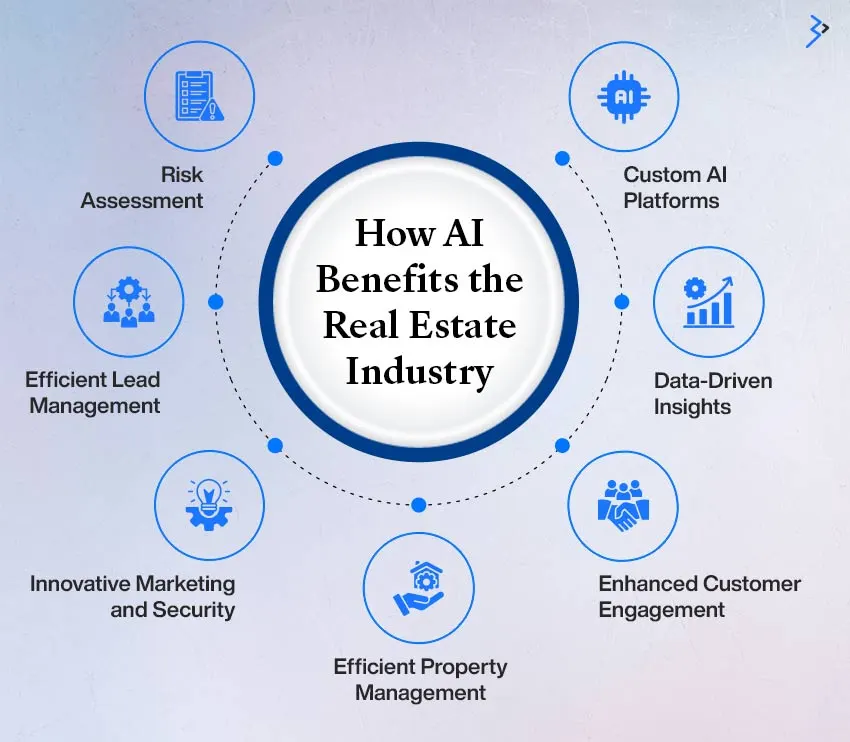Table of contents
AI Applications in Real Estate
How AI Benefits the Real Estate Industry
Challenges and Risks of AI Adoption in Real Estate
Case Studies: Real-World Applications of AI in Real Estate
The Future of AI in Real Estate
Frequently Asked Questions
Wrap Up
Artificial Intelligence (AI) and Machine Learning (ML) have revolutionized industries globally, and the real estate sector is no exception. By 2025, AI's transformative influence is set to become even more evident, driving efficiency, enhancing customer experiences, and improving operational workflows.
Studies reveal that businesses leveraging AI in real estate witnessed a 7.3% increase in productivity, a 6.9% boost in customer interaction, and a 5.6% enhancement in operational effectiveness. Additionally, 52% of companies aim to integrate AI assistants to streamline processes and achieve better outcomes.
This blog explores how AI applications in real estate, such as property valuation, predictive analytics, virtual assistants, and more, are reshaping the industry. It will also discuss real-world examples, challenges, and future trends, offering a comprehensive understanding of AI's potential to redefine the real estate landscape.
AI Applications in Real Estate
The AI-driven real estate market has experienced remarkable growth, with projections showing a substantial rise from USD 164.96 billion in 2023 to USD 226.71 billion in 2024, ultimately reaching USD 731.59 billion by 2028. This growth represents a compound annual growth rate (CAGR) of 34.0%.
Here are some key applications of AI in the real estate industry:
Property Valuation
AI's ability to automate property valuation has been a game-changer for the real estate industry. Traditionally, property appraisals relied on manual analysis, making them time-consuming and prone to errors. AI-powered algorithms have transformed this process by analyzing extensive datasets—such as historical sales, property conditions, neighborhood dynamics, crime rates, and market trends—within seconds. This ensures accurate, consistent, and unbiased valuations, reducing turnaround times and increasing trust in the process.
By leveraging machine learning models, real estate professionals can predict market values, assess competitive pricing, and deliver tailored insights to buyers and sellers. This enhances decision-making and minimizes risks associated with subjective appraisals. The integration of intelligent systems also allows real estate platforms to provide near-instantaneous valuation services, further streamlining operations.
Key Benefits:
- Analyzes historical data and market trends for precise property valuations
- Reduces biases and improves valuation accuracy and trust
- Enables rapid turnaround times for faster decision-making
Predictive Analytics
Predictive analytics has emerged as a cornerstone of AI applications in real estate. Using vast datasets, AI systems analyze market trends, economic indicators, and even social media sentiments to forecast market shifts. This empowers investors, agents, and developers to make data-driven decisions, minimizing risks and maximizing returns.
For instance, real estate professionals can predict housing demand, identify emerging market opportunities, and adjust pricing strategies proactively. Predictive models also enable developers to forecast construction costs and timelines, improving project planning. The ability to continuously update predictions based on new data ensures that stakeholders stay ahead of market dynamics.
Key Benefits:
- Processes large datasets for actionable market insights
- Forecasts of shifts in housing demand and market trends
- Helps mitigate risks and optimize investment strategies
Chatbots and Virtual Assistants
AI-powered chatbots and virtual assistants have revolutionized client interactions in real estate. These tools provide 24/7 support, helping to manage inquiries, filter leads, and schedule appointments. Automating repetitive tasks frees agents up to focus on high-priority activities, enhancing efficiency and customer satisfaction.
Virtual assistants also analyze customer preferences to offer tailored property recommendations, creating a personalized experience. Additionally, they automate marketing efforts by managing social media posts, property listings, and email campaigns, ensuring consistent engagement. Their ability to handle document management, transaction tracking, and reminders further streamlines administrative processes, improving operational workflows.
Read More-: Chatbots and Their Impact on Customer Support
Key Benefits:
- Automates lead generation and communication for improved efficiency
- Provides personalized property recommendations based on customer preferences
- Streamlines scheduling, document management, and marketing efforts
Personalized Property Recommendations
AI-driven recommendation engines simplify property searches for buyers and renters. AI systems provide highly tailored property suggestions by analyzing user preferences, browsing history, and past interactions, saving time and enhancing the customer experience," according to Logan Ransley, Co-Founder of Landlord Studio.
These systems use collaborative filtering to compare individual preferences with similar users, ensuring accurate recommendations. Additionally, image recognition technology matches property features with client needs, enabling a seamless and customized search process. This approach not only accelerates decision-making but also fosters stronger customer relationships.
Key Benefits:
- Customized property suggestions are based on individual preferences and browsing history
- Uses collaborative filtering for more accurate and relevant recommendations
- Integrates image recognition to match property features with customer needs
Dynamic Pricing and Market Analysis
Dynamic pricing powered by AI enables real estate agents to adjust property prices in real-time based on market conditions. By analyzing recent sales, demand fluctuations, and economic factors, AI systems help agents position properties competitively. This ensures optimal pricing strategies that maximize revenue and minimize vacancies.
Market analysis tools provide agents with actionable insights into buyer behavior, neighborhood trends, and property values. These insights enable agents to refine marketing strategies, target the right audience, and stay ahead in a competitive market.
Key Benefits:
- Enables real-time adjustments to property pricing based on market trends
- AI analyzes buyer behavior and neighborhood developments for strategic insights
- Enhances competitive positioning and marketing effectiveness
Virtual Tours and Augmented Reality
Immersive virtual tours and augmented reality (AR) experiences have revolutionized property viewings. These technologies allow potential buyers to explore properties remotely, offering a realistic and engaging experience. Virtual tours save time, reduce the need for physical visits, and make properties accessible to global buyers.
AR takes this a step further by enabling clients to visualize property modifications, such as interior designs or furniture placements, in real-time. This enhances decision-making and increases buyer confidence. For agents, these tools offer a competitive edge, attracting tech-savvy clients and boosting property marketing efforts.
For a practical example of AI-enhanced 360° tours, Giraffe360's virtual tour solution integrates high-resolution panoramas with blue-sky enhancement, a residential digital twin, interactive 3D floor plans, and privacy/lead-gating to capture buyer intent and reduce time on market. These features align with the AI benefits outlined above—higher engagement, data insights from viewer interactions, and scalable remote viewings—making it ideal for agents who want immersive experiences buyers actually finish.
Key Benefits:
- Provides immersive property experiences for remote buyers
- Enables visualization of design modifications through augmented reality
- Reduces physical visits and streamlines the decision-making process
Read More: Best Real Estate ERP and CRM Platforms To Use in 2025
Smart Property Management
AI has redefined property management by streamlining maintenance, rent collection, and tenant interactions. AI-powered systems monitor property equipment and systems in real-time, enabling predictive maintenance that minimizes costs and enhances tenant satisfaction.
Additionally, automated systems handle routine tasks such as scheduling property inspections, processing maintenance requests, and managing tenant inquiries. This frees property managers to focus on higher-value tasks and improves operational efficiency.
Key Benefits:
- Enables predictive maintenance for reduced costs and improved tenant satisfaction
- Automates routine tasks like inspections and tenant communication
- Enhances operational efficiency for property managers
Fraud Detection and Security
Fraudsters often target real estate transactions involving significant financial assets. AI-powered systems enhance security by detecting anomalies in transaction patterns and verifying identities through advanced algorithms. This prevents fraudulent activities and ensures safe transactions.
AI also bolsters the security of smart homes by monitoring systems and identifying potential breaches. These measures provide homeowners with peace of mind and protect their investments.
Key Benefits:
- Identifies unusual transaction activities for fraud prevention
- Ensures secure identity verification during real estate transactions
- Enhances smart home security through continuous monitoring
Risk Assessment and Investment Analysis
AI revolutionizes risk assessment in real estate by offering actionable insights to investors. It evaluates economic stability, tenant behavior, and potential environmental threats, ensuring smarter investment decisions. By analyzing large datasets and identifying patterns, AI minimizes uncertainties, helping investors maximize returns.
Key Benefits:
- Assesses regional economic stability for investment viability
- Analyzes tenant behavior to predict potential risks
- Anticipates environmental threats like natural disasters
Read More: Why Odoo ERP Is The Best Solution For Real Estate Management
Document Automation
AI-driven tools streamline real estate paperwork, expediting transactions and ensuring accuracy. These systems analyze contracts, extract critical information, and identify obligations, risks, and clauses, reducing human error and saving time. Workflow automation further simplifies administrative tasks, ensuring faster deal closures.
Key Benefits:
- Employs smart tools to extract key legal details
- Enables electronic signatures for faster deal finalization
- Automates workflows to streamline real estate transactions
Tenant Screening
AI-powered tenant screening ensures landlords select reliable tenants, reducing risks of default or eviction. By analyzing credit scores, rental histories, and employment records, AI enhances accuracy and speeds up the selection process, improving outcomes for landlords and property managers.
Key Benefits:
- Evaluates tenant creditworthiness through advanced algorithms
- Review rental and employment histories for reliability
- Ensures faster and more accurate tenant selection processes
Virtual Staging
Virtual staging leverages AR/VR technology to furnish properties digitally, creating appealing spaces without heavy investments. Buyers can customize interiors, visualize furniture placement, and modify floor plans, enhancing the decision-making process while saving costs for realtors.
Key Benefits:
- Uses AR/VR for realistic property staging
- Enables customization of interiors and layouts
- Reduces costs compared to traditional staging methods
How AI Benefits the Real Estate Industry
From property management to investment analytics, AI’s applications have empowered real estate professionals, investors, and developers to achieve unparalleled efficiency and precision. Here’s a deep dive into how AI is transforming the real estate landscape and the challenges that come with its adoption.
Custom AI Platforms
Tailored AI solutions enable predictive analytics, automated property valuations, and personalized recommendations. These features help professionals make data-backed investment decisions while offering clients an enhanced, personalized experience.
Data-Driven Insights
AI-powered tools analyze vast datasets to identify market trends, predict future opportunities, and assess risks. This capability ensures more innovative investments and sharper strategies in an ever-changing market.
Enhanced Customer Engagement
AI-driven chatbots and virtual assistants automate client interactions, address queries, schedule property viewings, and improve lead conversion rates. These tools help real estate businesses maintain consistent, high-quality customer engagement.
Efficient Property Management
AI simplifies property management processes, such as rent collection, lease renewals, and maintenance prediction. It minimizes manual tasks, ensuring seamless and timely operations.
Innovative Marketing and Security
AI facilitates targeted advertising campaigns by analyzing consumer preferences and behavior. Additionally, integrating blockchain technology with AI ensures secure, efficient transactions, fostering stakeholder trust and transparency.
Read More: Augmented Reality: The Smart Technology To Optimize Real Estate Business
Challenges and Risks of AI Adoption in Real Estate
While AI offers numerous benefits, its adoption comes with hurdles that real estate businesses must address. These challenges span across data privacy, implementation costs, and ethical considerations.
1. Data Privacy and Security Issues
Real estate transactions involve sensitive client data, such as financial records and personal information. Ensuring robust data protection measures while complying with regulations like GDPR and CCPA is crucial. However, achieving this requires significant resources and technical expertise.
2. Data Quality and Availability
AI systems rely on high-quality data for accurate analysis and predictions. Integrating diverse data sources, such as public records, property listings, and market trends, can be complex. Poor-quality or incomplete data risks producing flawed insights.
3. High Implementation Costs
Implementing AI solutions in real estate requires substantial investment. Development costs, ongoing maintenance, and updates can deter smaller firms from adopting AI. Collaborating with AI app development experts can streamline this process, but it comes at a premium.
4. Technological Complexity
The real estate industry often lacks the technical knowledge to create and manage AI systems. Training employees, hiring experts, and integrating AI with existing infrastructure, such as legacy workflows, can be daunting.
5. Resistance to Change
Some real estate professionals may resist adopting AI, fearing job displacement or struggling to understand its advantages. Overcoming this resistance requires comprehensive training and a cultural shift toward embracing technology.
6. Ethical Considerations
AI models can inadvertently perpetuate biases in the data they’re trained on. This can lead to unfair practices in pricing, tenant screening, or property valuation. Addressing these biases is essential to maintain ethical and equitable business practices.
7. Legal and Regulatory Challenges
The legal landscape for AI in real estate is still evolving. Determining liability for AI-generated decisions, especially in cases of errors or disputes, is complex. Businesses must stay updated with regulatory changes and ensure compliance.
8. Interoperability Issues
Incompatibility between different AI tools and data formats limits system integration and cooperation. This can hinder seamless operations, particularly in environments with diverse technology ecosystems.
Case Studies: Real-World Applications of AI in Real Estate
The integration of AI in real estate is already delivering impressive results across the globe. Here are some examples of companies successfully leveraging AI to transform their operations:
| Real Estate Platform | AI Use Case | Impact/Benefit |
| Zillow | Uses AI to provide real-time property value estimates via the "Zestimate" tool. | Analyzes data like public records and recent sales to provide actionable insights for buyers and sellers. |
| Realtor.com | AI algorithms for tagging and categorizing property images. | Helps buyers quickly find homes with specific features (e.g., wooden floors, modern kitchens). |
| Compass | Leverages AI to offer market trend insights to real estate agents. | Enables agents to provide informed advice, improving client satisfaction. |
| Redfin | The AI-powered platform offers personalized home recommendations based on user preferences and search patterns. | Enhances user experience by providing tailored property search results. |
| Houzz | Integrates AI-powered visual search for furniture and decor items. | Assists users in finding similar items for home renovations and interior design. |
The Future of AI in Real Estate
AI’s role in real estate is expected to grow significantly, driven by technological advancements and changing consumer expectations.
Emerging AI Trends and Innovations
- Sustainability: AI will enhance green building designs by optimizing energy usage and forecasting environmental impact.
- Blockchain Integration: By combining AI with blockchain technology, real estate transactions will become more transparent and secure.
- Edge AI: This technology brings AI processing closer to devices, reducing latency and enabling faster decision-making.
AI and the Real Estate Market Forecast
The global real estate AI market will reach $20 billion by 2030. Property tech innovations, the rise of smart cities, and widespread digital transformation fuel this growth.
Frequently Asked Questions
1) How can AI benefit my real estate business?
AI optimizes operations, enhances customer experiences, and provides data-driven insights for smarter decision-making.
2) How do I get started with integrating AI into my real estate business?
Begin by identifying repetitive tasks that can be automated, such as document management or customer support. Explore AI solutions tailored to your needs.
3) What kind of data do I need to implement AI in my real estate business?
Key data includes transaction records, property details, tenant histories, and market trends.
4) What are the benefits of using Generative AI for dynamic pricing in real estate?
Generative AI analyzes real-time demand trends, market fluctuations, and customer preferences to ensure competitive pricing.
5) How can Generative AI help with property descriptions and content generation?
It creates compelling, SEO-optimized property listings to attract buyers and improve search visibility.
6) How does Generative AI enhance virtual property tours?
AI integrates 3D imaging and VR technology to offer immersive, interactive tours for remote buyers.
7) How does Generative AI assist in personalized recommendations and lead generation?
It analyzes user data to provide tailored property suggestions and identify high-potential leads.
- What are the costs of integrating Generative AI into my real estate business operations?
Costs vary based on the solution’s scale and complexity, ranging from software subscriptions to custom-built systems.
Wrap Up
AI is reshaping the real estate industry by enabling smarter, faster, and more accurate decision-making. From predictive analytics to personalized customer experiences, AI solutions have become indispensable for real estate professionals aiming to stay competitive.
However, adopting AI comes with challenges, such as high costs, data security concerns, and ethical issues. Addressing these obstacles requires careful planning, regulatory compliance, and continuous innovation.
Integrating AI into your real estate business allows you to streamline operations, enhance customer engagement, and gain a competitive edge. Ready to take your business to the next level? Collaborate with Brainvire’s experienced AI solution providers to unlock your full potential.
Related Articles
Digital Transformation
Hyper-Personalized Banking: Driving Customer Loyalty and Engagement with AI-Powered Adobe Experiences
Digital Transformation
Leveraging 3rd Party LLMs: A Guide to Commercial AI Platforms
Digital Transformation
AI-Driven Security: Protecting Your eCommerce App and Customer Data in an Evolving Threat Landscape



